Small grants programme 2018: analysis and next steps
It’s such an honour to be able to award funding to worthy research projects and feel like RSTMH is making a difference to people’s careers and hopefully the field of tropical medicine and global health.
Last year, we had some incredible applications to our small grants programme that covered everything from TB, malaria, HIV and almost all neglected tropical diseases to many non-communicable diseases, including diabetes, cancer and cardiovascular disease.
Improvements to this year’s programme
However, we also felt there were aspects we could improve and with the data from our member survey and our five-year strategy now launched, we opened what we hope to be an improved small grants programme for submissions in February.
Our grants are for up to £5,000 each, for early career researchers and professionals to carry out initial research on a topic within tropical medicine or global health.
The grants are primarily designed to be used for seed funding a new idea or concept. The application and review process are designed to be short and straightforward, less demanding than larger grants, thus making them more accessible to researchers applying for funds for the first time.
Prioritising members and themes
In response to our strategy review, we are now only awarding small grants to our members, though anyone can apply and have their application assessed. We are also prioritising research relating to our priority themes. These include malaria, areas of neglected disease which intersect with non-communicable diseases, as well as emerging diseases and drug-resistant infections.
This year we have moved to an electronic platform for submission and assessment, to ensure our ever-growing number of applications are collected more easily and securely. We also separated our small grants programme from our travel scholarships. This was, for the most part, in response to existing members outside of the UK feeling they were unable to attend RSTMH meetings due to the high costs.
The majority of these members are also early on in their careers. The travel scholarships will be prioritised for early career researchers to attend RSTMH meetings in the UK.
Analysis of this year’s applications
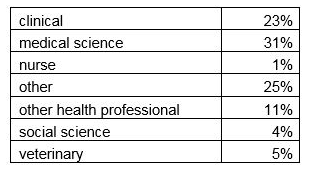
Last year we received 216 small grant applications. This year, we received a staggering 624 applications from people in 52 countries.
Diversity is a focus and ambition for all our work. Breaking down the applications by gender, we estimate that 54% are male and 46% female.
In terms of background, medical sciences (34%) and clinical practice (23%), together made up 57% of the applicants.
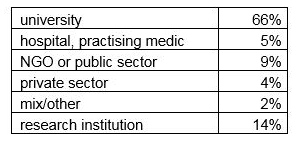
Our data shows there is more work to be done to encourage more social sciences, one health and broader disciplines that are so important in our field of work.
In terms of the sectors that applications came from, academic institutions were by far the most common, with 66% of the total.
We’re working hard to ensure NGOs, the wider public sector and other organisations are aware of our work and can contribute as much as possible.
Who is assessing the small grants?
This year, we recruited a group of Global Assessors to review our increasing number of small grant applications.
Global Assessors are volunteers, based across the world, who represent a range of disciplines and sectors. Their role is to assess applications and abstracts in an independent, consistent and rigorous way.
We currently have 40 Global Assessors and we’ll continue to recruit more as other opportunities are coming up later this year.
Do similar grant programmes exist?
One of the things we were told during our strategy review is that our small grants are unique in terms of size, global accessibility and ease of process. This year we again asked all applicants if they were able to access this level and type of funding from elsewhere, for their project.
Of the 624 applicants, around 120 could find alternative and equivalent sources of funding for their research – the remainder could not.
We believe funding at this level is crucial to the research pipeline and is rarely available without conditions around thematics or residency. We are currently working hard to ensure as many of this year’s strong applications as possible are funded.
Where were our researchers from?
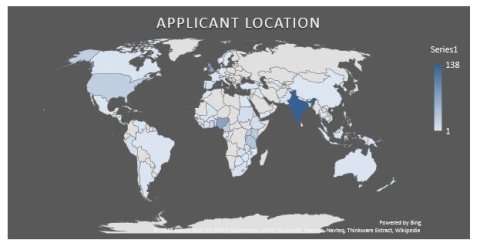
The majority of our members are based outside of the UK and it was important to us that news of our small grants would reach as many people as possible, to ensure diversity of grant applications.
The map below shows a breakdown of where our applicants are from by country. This shows coverage across all continents; however, some countries and some regions are still low.
Shortly we will be announcing plans that will help us to understand if these low numbers are due to a lack of need for grants of this kind, or if it due to low awareness.
Please keep an eye on our future newsletters for more information.
Where is the research being carried out?
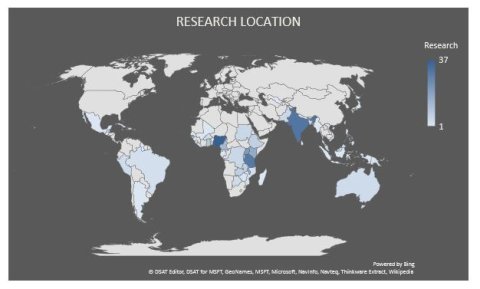
Similarly, we wanted to have a review of the applications to understand where the proposed research would be carried out.
Again, as you can see below all continents are covered but there remain many countries and regions with no or low levels of research.
Similarly, analysis under our new strategy will help us to understand whether this lack of focus represents a low need for it, or again a lack of awareness.
What topics are included in the applications?
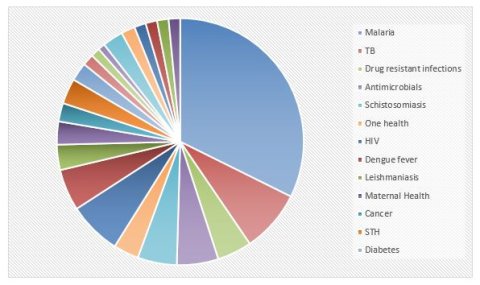
Applicants were asked to provide a title and an easy to understand the description of their research, so we could have a view of the kinds of research that are being put forward for our small grants.
The data below shows some of the keywords that appear in either of these two pieces of information. At this stage, we don’t have a final analysis of this data, meaning there are areas of overlap within the categories.
The applications are now being looked at by our Global Assessors. We anticipate that we will be announcing and distributing awards next month, in June.
The cycle of small grants for the rest of the year includes collating the results of the research that we funded last year, and analysing that alongside our other work and activities, to understand the impact we have made to tropical medicine and global health, and the impact we could bring.